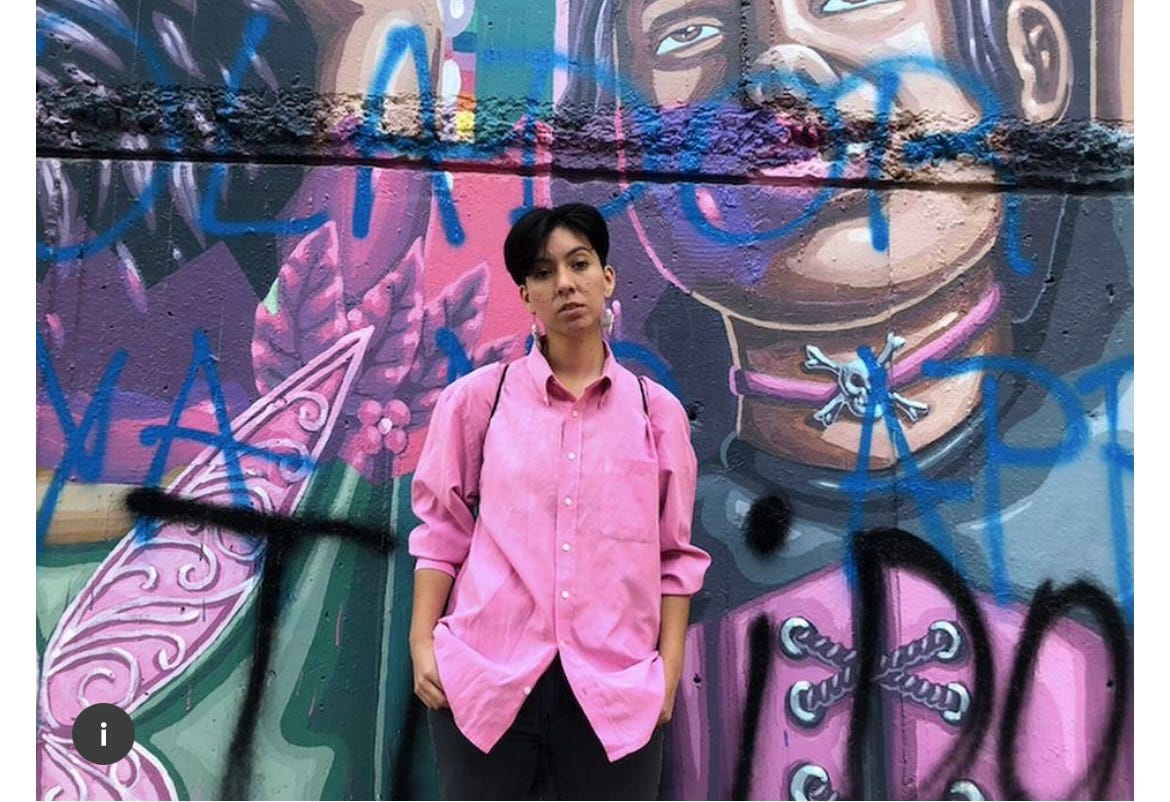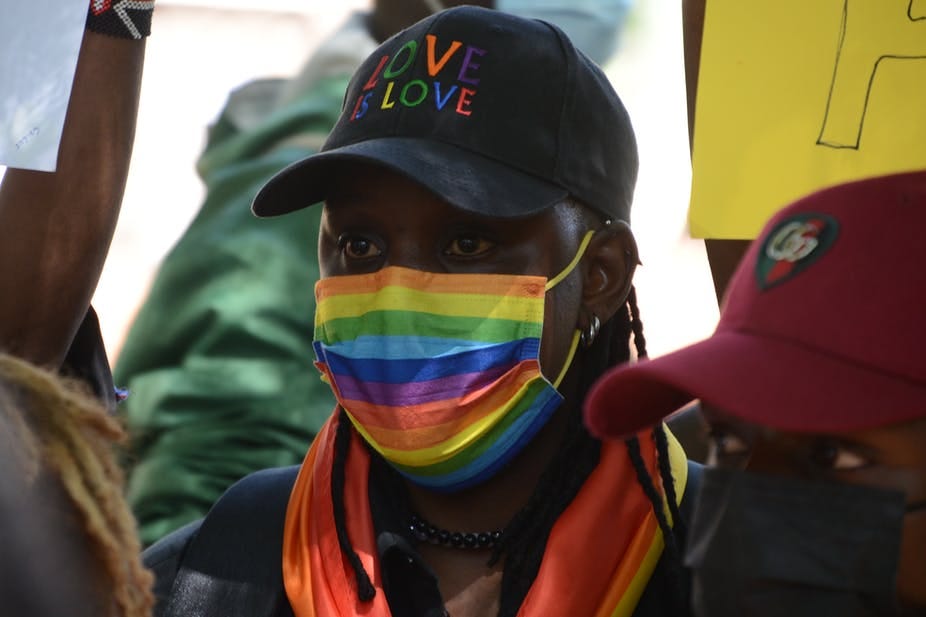Global Roundup: Thailand Young Women Activists, Chile LGBTQ+ Artists vs Homophobia, Nigeria Restrictive ‘Cross-Dressing’ Bill, Queer Kenyan Activism, Indonesia Woman Rapper
Curated by FG contributor Samiha Hossain
Tawan makes the three-fingered Hunger Games salute, which has become a symbol of resistance among pro-democracy groups from Myanmar to Hong Kong [Ginger Cat/Al Jazeera]
Tawan Tuatulanon is part of the underground anti-monarchy group in Thailand, Thaluwang, a name that translates to “Shattering the Palace.” It is made up mostly of young people in their 20s, using performance art, provocative stunts and other unusual tactics to question the king’s immense hold on power, actions that were taboo until only a couple of years ago. She is one of several activists in detention in Thailand. She spoke to Al Jazeera before her detention.
18-year-old Supitcha ‘Maynu’ Chailom is also a part of the group. She caught the country’s attention when she was photographed raising the three-finger salute in front of hundreds of university students in a symbol of defiance taken from the Hunger Games movie that has since come to define opposition to authoritarian regimes across Southeast Asia.
Thaluwang also supports gender equality and women’s rights, so this is one reason why I became involved in the organization…This country lacks space for young people’s dreams, games are still demonized in the press and blamed for many issues without looking at how parents raise their children and how this country does not support young people. - Supitcha ‘Maynu’ Chailom
Thaluwang has moved away from mass protests and speeches delivered to large crowds, instead adopting tactics that legal experts say are difficult to define as illegal. The approach is intended to make activists less vulnerable to legal harassment, but the crackdown has continued.
For the past two years, protesters have been calling for former coup leader and now Prime Minister Prayuth Chan-ocha to step down, and for new elections to be held. But it is their calls for royal reform that have sent shockwaves through the country. There has been rampant intimidation, surveillance, legal harassment and arrests of government critics at home, in the workplace and on university campuses.
Days after speaking to Al Jazeera in April, multiple Thaluwang activists were arrested. Maynu has been released on bail, but Tawan is still in detention and on hunger strike. Over the last two weeks, three other women who represent Thaluwang have also been detained without bail, including a 17-year-old girl. In response, dozens of protesters demonstrated in front of the United States embassy on May 11, handing in a petition calling on the US to urge Thailand to release political prisoners and stop the use of Section 112, which criminalized those who speak against the monarchy. The extent to which authorities are going to silence young women and punish them for speaking their mind is unprecedented – but Tawan told Al Jazeera that she will not be deterred.
We have been followed by police and it makes us feel unsafe. But with Section 112, I’m still not afraid. If anything, it makes me feel that I need to fight even more, and I’ve mentally prepared myself to soon be in jail. So you could definitely say that I am a very different Tawan than I was before. - Tawan Tuatulanon
LGBTQ+ street art guide Vale Nein (he/him) stands in front of a vandalised mural in Santiago, Chile on April 13, 2022. Thomson Reuters Foundation/Charis McGowan
CW: homophobia
Vandals have defaced a mural in an open-air museum dedicated to Chile's LGBTQ+ community with dozens of homophobic slurs days after it was completed. Rights campaigners say such attacks reflect an increasingly hostile pushback against slow but steady progress towards LGBTQ+ equality in Chile, where conservative attitudes and the Roman Catholic Church still hold heavy sway.
They're vandalizing our artistic spaces, where we are finally able to be visible. It's symbolic. They're killing people, too. - Vale Nein, trans man musician
The project was established as a place of memory, marking the place where 24-year-old gay man Daniel Zamudio was tortured and killed in an adjoining park 10 years ago. The horrific murder drove the then-conservative government to pass anti-hate crime legislation known as Zamudio's law, which recognizes violence motivated by homophobia but has proven difficult to apply in written and verbal abuse cases. Almost half of the anti-hate crime cases brought to court under the law have been dismissed.
However, the mural to honor Zamudio's memory has been controversial, even within the LGBTQ+ community. Some rights groups accused the artists of incentivizing homophobic attacks by including erotic photographic images on one panel. The artists agreed to cover up the photos, but it did not stop it from being targeted by vandals. A portrait of Zamudio is covered by graffiti, and a large text demanding public health access for trans Chileans is obscured by a scrawl reading "pedophilia is not art."
I paint the word 'lesbian,' and it's immediately crossed out. They try to silence us and make out that we don't exist. - Lesbian street artist Marcela Paz Pena, who goes by the name Isonauta
Ramon Gomez from Movilh, Chile's largest LGBTQ+ rights group, says that recent political gains for the community have come at a price with increasingly violent attacks targeting the community. Gomez said his group had seen an "explosive increase" in reports of violent hate crime since COVID-19 restrictions were lifted earlier this year.
The Santiago Municipality plans to arrange talks between artists and neighborhood committees, which artists welcomed but said would not be enough to stop the vandals. They say broader anti-hate legislation is needed to protect LGBTQ+ street art, which they say can help to foster greater acceptance.
Indigenous trans artist Poleo Painemal spent six days working on the mural. Her panel showed trans children playing in a room of pink hues and included an indigenous Wiphala flag bearing the trans symbol. Painemal wanted to depict a childhood free from gender binary constraints, something she said freely existed in indigenous Mapuche communities before it was stigmatized by Catholic colonizers. Vandals sprayed a penis on the painting and scrawled the word "disgusting" across the children's images.
It hurts and makes me angry. [But] it shows this work is necessary because people still have so much hate against us and we need to educate them. - Poleo Painemal
LGBT+ people staged a protest against a reviled bill that would ban "crossdressing" in Nigeria. (Ani Kayode) via Pink News
The LGBTQ community marched in a risky demonstration, dressed in rainbow-colored vests, in Nigeria's capital, Abuja, to protest a bill introduced by lawmakers in Nigeria's lower house of parliament last month seeking to ban ‘cross-dressing’. The new measure calls for a punishment of six months in jail or a fine of about $1,200 for cross-dressers.
A mob chattered as a transgender woman was beaten and stripped in Lagos weeks after the bill was introduced. This is an outcome LGBTQ activists feared and the reason they say they’re fighting back.
What laws like this do is that they basically encourage people to take violence into their own hands, just as we had after the SSMPA was passed — individuals forming vigilantes and going into people's homes because they suspect that they're queer, beat them, murder them. - Ani Kayode, chair at the Queer Union for Economic and Social Transformation (QUEST9ja)
The cross-dressing bill is an expanded version of Nigeria's 2013 Same Sex Marriage Prohibition Act that punishes gay sex with up to 14 years in prison. The bill would allow comedians to cross-dress for entertainment purposes, but activists say it will worsen the existing violence against nonbinary or transgender people.
The cross-dressing bill will undergo several readings in parliament and be debated before it is passed and forwarded to President Muhammadu Buhari for approval. The LGBTQ community is advocating for the president to not sign it.

A Nairobi protest against homophobic statements made by a government minister. JOHN OCHIENG/SOPA Images/LightRocket via Getty Images via The Conversation
CW: homophobia, transphobia
Sheila Lumumba was a 25-year-old non-binary lesbian who was murdered “in the most gruesome manner” in April 2022. #JusticeForSheila is a hashtag that mobilizes public engagement on the murder of queer people in Kenya generally and calls for public accountability for Sheila’s murder. Social media hashtags have long been used in Kenya around the death of women, sex workers and queer people.
The Gay and Lesbian Coalition of Kenya reports that in Kenya, 53% of LGBTQ+ people are physically assaulted. In 2021, at least three reports were captured in mainstream media that involved either murder or suspicious deaths. A common part of homophobia in Kenya is the persistent threat of homelessness if a person’s orientation is revealed.
It is important, that in reading about queer death and violence we recognise the class disaparities that shape how people experience homophobia and transphobia. - Awino Okech
Okech says that the “anti-homophobic laws” are relics from the colonial era in the Kenyan penal code. The 2019 Repeal162 case in Kenya was a direct effort by queer organizations to challenge these provisions in the penal code. She believes that patriarchy and the way societies centralize heterosexuality lead to these violent attacks.
These laws have since independence been used by the government to define African-ness and African culture in heterosexual and patriarchal terms thus justifying and cushioning violence. - Awino Okech
Okech says that one way to address these injustices is to strengthen the legal and policing response to these attacks and deaths. However, for those who do not believe in the legal and policing systems because “they punish rather than restore relations,” she says people have to build movements that keep targeted communities safe. She also recognizes the importance of transforming societies by doing the long term, often difficult work of conscientising communities.
PHOTO: EJJA PAHLEVI
Ramengvrl is a rapper from Indonesia and one of Asia’s top rappers. She has been featured on a giant billboard in New York’s Times Square, promoting her single “WHO DIS?” as part of Spotify’s EQUAL program, which highlights talented women in music, from around the world.
Last week, Ramengvrl released her latest single “FACTS,” a fun “let-me-flex-my-success” track that showcases her smooth flow. The single is part of the EP compilation series asiatic.wav Vol 1, which also features Mongolian hip-hop artist Mrs M, Thailand’s Phum Viphurit, and more.
In 2016, Ramengvrl quit her corporate job and released her breakthrough single with local label Underground Bizniz Club. Titled “I’m Da Man,” it’s a trap number full of swagger and bravado, about being “the man” and killing it in the rap game despite being the new kid on the block. Ramengvrl said that today, there is less gender bias compared to when she started out, but it is still far from ideal.
Things definitely have progressed. Now, when there’s a new female rapper coming into the room, people don’t go, ‘What can she do? Does she even have bars?’ But we’re not there yet, because the number of females who rap, you can still count them with one hand, probably. - Ramengvrl
Young Indonesians are attracted to Ramengvrl’s unapologetic confidence. It is reflected in her music, provocative music videos, and quirky sense of style. But beyond all the bravado and explicit references, it is the themes of women empowerment and self-acceptance that stand out in her music. Ramengvrl said she has always spoken her mind, even if no one else in her family is as vocal about their convictions as she is.
I don’t know where I got it from, but it’s always been there, even though I didn’t show it in school, because you try to fit in. My mother has told me, many times, that I’m too extreme, but for me, it’s just regular talk. - Ramengvrl
Ramengvrl hopes that more Indonesians would appreciate their local language and talents more, rather than only supporting things that are deemed “international.” For that reason, she is in no rush to bring her music to the world. She is happy with what she has achieved so far in her career but she continues to work hard to achieve her next goals.
Samiha Hossain (she/her) is a student at the University of Ottawa. She has experience working with survivors of sexual violence in her community, as well as conducting research on gender-based violence. A lot of her time is spent learning about and critically engaging with intersectional feminism, transformative justice and disability justice.
Samiha firmly believes in the power of connecting with people and listening to their stories to create solidarity and heal as a community. She refuses to let anyone thwart her imagination when it comes to envisioning a radically different future full of care webs, nurturance and collective liberation.








